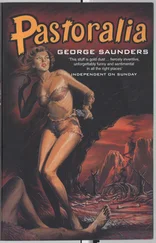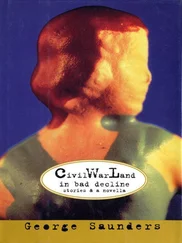What did we want? We wanted the lad to see us, I think. We wanted his blessing. We wanted to know what this apparently charmed being thought of our particular reasons for remaining.
hans vollman
Truth be told, there was not one among the many here — not even the strongest — who did not entertain some lingering doubt about the wisdom of his or her choice.
roger bevins iii
The loving attentions of the gentleman having improved our notion of the boy, we found ourselves craving the slightest association.
the reverend everly thomas
With this new-established prince.
roger bevins iii
Soon the line of people waiting to speak to the lad ran down the path as far back as the tan sandstone home of Everfield.
hans vollman
XXVII.
I will be brief.
jane ellis
I doubt it.
mrs. abigail blass
Mrs. Blass, please. Everyone will get a—
the reverend everly thomas
“Once at the Christmastide Papa took us to a wonderful village festival.” Ugh.
mrs. abigail blass
Please don’t crowd. Simply stay in line. All will be accommodated.
hans vollman
She yips and yips and must always be first. In all things. How, please tell me, does she merit such—
mrs. abigail blass
You could learn a thing or two from her, Mrs. Blass. Look at her posture.
hans vollman
How calm she remains.
the reverend everly thomas
How clean her clothing is kept.
roger bevins iii
Gentlemen?
If I may?
Once at the Christmastide Papa took us to a wonderful village festival. Above a meatshop doorway hung a marvelous canopy of carcasses: deer with the entrails pulled up and out and wired to the outside of the bodies like tremendous bright-red garlands; pheasants and drakes hung head-down, wings spread by use of felt-covered wires, the colors of which matched the respective feathers (it was done most skillfully); twin pigs stood on either side of the doorway with game hens mounted upon them like miniature riders. All of it bedraped in greenery and hung with candles. I wore white. I was a beautiful child in white, long rope of hair hanging down my back, and I would willfully swing it, just so. I hated to leave, and threw a tantrum. To assuage me, Papa bought a deer and let me assist him in strapping it to the rear of the carriage. Even now, I can see it: the countryside scrolling out behind us in the near-evening fog, the limp deer dribbling behind its thin blood-trail, stars blinking on, creeks running and popping beneath us as we lurched over groaning bridges of freshcut timber, proceeding homeward through the gathering—
jane ellis
Ugh.
mrs. abigail blass
I felt myself a new species of child. Not a boy (most assuredly) but neither a (mere) girl. That skirt-bound race perpetually moving about serving tea had nothing to do with me.
I had such high hopes, you see.
The boundaries of the world seemed vast. I would visit Rome, Paris, Constantinople. Underground cafés presented in my mind where, crushed against wet walls, a (handsome, generous) friend and I sat discussing — many things. Deep things, new ideas. Strange green lights shone in the streets, the sea lapped nearby against greasy tilted moorings; there was trouble afoot, a revolution, into which my friend and I must—
Well, as is often the case, my hopes were…not realized. My husband was not handsome and was not generous. He was a bore. Was not rough with me but neither was he tender. We did not go to Rome or Paris or Constantinople, but only back and forth, endlessly, to Fairfax, to visit his aged mother. He did not seem to see me, but only endeavored to possess me; would wiggle his little roach of a mustache at me whenever he found me (as he so often found me) “silly.” I would say something that I felt had truth and value in it, regarding, for example, his failure to get ahead in his profession (he was a complainer, always fancying himself the victim of some conspiracy, who, finding himself thus disrespected, would pick some trivial fight and soon be sacked) but he need only wiggle that mustache and pronounce mine “a woman’s view of the thing” and — that was that. I was dismissed. To hear him bragging about the impression he had made on some minor functionary with a “witty” remark, and to have been there, and heard that remark, and noticed the functionary and his wife barely able to refrain from laughing in the face of this pompous little nobody was…trying. I had been that beautiful child in white, you see, Constantinople, Paris, and Rome in her heart, who had not known, at that time, that she was of “an inferior species,” a “mere” woman. And then, of an evening, to have him shoot me that certain look (I knew it well) that meant “Brace yourself, madam, I will soon be upon you, all hips and tongue, little mustache having seemingly reproduced itself so as to be able to cover every entry point, so to speak, and afterward I will be upon you again, fishing for a compliment” was more than I could bear.
Then the children came.
The children — yes. Three marvelous girls.
In those girls I found my Rome, my Paris, my Constantinople.
He has no interest in them at all, except he likes to use them to prop himself up in public. He disciplines this one too harshly for some minor infraction, dismisses that one’s timidly offered opinion, lectures loudly to all regarding some obvious fact (“You see, girls, the moon hangs up there among the stars”) as if he has just that instant discovered it — then glances around to judge what effect his manliness is having on passers-by.
jane ellis
If you please.
Many are waiting.
mrs. abigail blass
Is he to care for them?
In my absence?
Cathryn is soon to begin school. Who will make sure her clothes are correct? Maribeth has a bad foot and is self-conscious and often comes home in tears. To whom will she cry? Alice is nervous, for she has submitted a poem. It is not a very good poem. I have a plan to give her Shakespeare to read, and Dante, and we will work on some poems together.
They seem especially dear to me now. During this pause. Fortunately, it is a minor surgery only. A rare opportunity, really, for a person to pause and take stock of her—
jane ellis
Mrs. Ellis was a stately, regal woman, always surrounded by three gelatinous orbs floating about her person, each containing a likeness of one of her daughters. At times these orbs grew to extreme size, and would bear down upon her, and crush out her blood and other fluids as she wriggled beneath their terrible weight, refusing to cry out, as this would indicate displeasure, and at other times these orbs departed from her and she was greatly tormented, and must rush about trying to find them, and when she did, would weep in relief, at which time they would once again begin bearing down upon her; but the worst torment of all for Mrs. Ellis was when one of the orbs would establish itself before her eyes exactly life-sized and become completely translucent and she would thus be able to mark the most fine details of the clothing, facial expression, disposition, etc., of the daughter inside, who, in a heartfelt manner, would begin explaining some difficulty into which she had lately been thrust (especially in light of Mrs. Ellis’s sudden absence). Mrs. Ellis would show the most acute judgment and abundant love as she explained, in a sympathetic voice, how the afflicted child might best address the situation at hand — but alas (herein lay the torment) the child could not see or hear her in the least, and would work herself, before the eyes of Mrs. Ellis, into ever-increasing paroxysms of despair, as the poor woman began to dash about, trying to evade the orb, which would pursue her with what can only be described as a sadistic intelligence, anticipating her every move, thrusting itself continually before her eyes, which, as far as I could tell, were incapable, at such times, of closing.
Читать дальше












